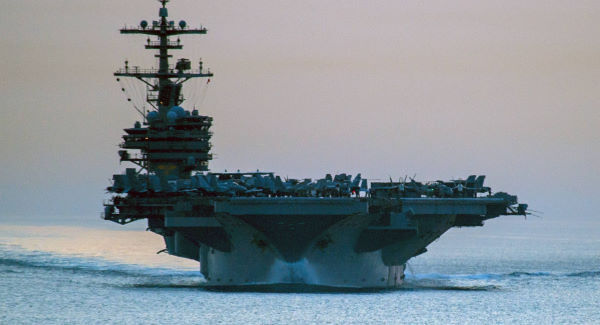US must raise its game against Iraqi militants

A DISASTER is unfolding in Iraq. It is in part a result of the failed Syria and broader Middle East policies pursued by the West in the past four years.
Insurgents reportedly led by the Islamic State of Iraq and the Levant (ISIL) have occupied Mosul, Iraq’s second-largest city, and may be planning to push further south to the capital, Baghdad.
ISIL, a largely Sunni jihadist group more radical than al Qaeda, seeks to establish an independent caliphate in parts of Iraq and Syria.
US president Barack Obama said he wouldn’t “rule out anything” when it comes to US involvement in the region, and some political analysts are already predicting possible US-led drone strikes or even air strikes.
It is possible that the US may now again become embroiled in direct military action in the Middle East. Washington, unfortunately, has no good options: It can’t allow Iraq to be overrun by a terrorist group that is capable of and willing to launch attacks on the US.
At the same time, Americans have no appetite to militarily support the ineffective, Shi’ite-dominated Nuri al-Maliki regime. Yet this is what the US will likely now have to do — with possible drone strikes, intelligence cooperation and other aid.
Any decisions the US makes will only be more gut wrenching by the fact that Iran’s Revolutionary Guards are reportedly supporting Maliki’s forces. So we would be intervening on the side of Iran.
This disastrous situation is due to a combination of Maliki’s incompetent governance, spillover from the Syrian civil war, and Washington’s unwillingness to take more modest steps to shore up Syria and Iraq several years ago — when that might have been enough.
In a column last summer, I argued that the administration had two reasonable policy options. Both were far short of air strikes or US ground troops in Syria or Iraq:
* Massively increase both military (small arms) and non-lethal aid to the moderate Syrian rebels, which at the time still had a fighting chance against president Bashar al-Assad and were also fighting ISIL.
* Significantly step up diplomacy and increase security aid to Iraq to stop ISIL’s resurgence and its efforts to promote sectarian violence there.
Many senior leaders within the Obama administration, including Robert Ford, the US ambassador to Syria who recently resigned, and secretary of state Hillary Clinton, advocated a similar approach.
It is not a given that US aid to the Syrian opposition and a continued American presence in Iraq would have prevented this crisis. But our inaction worsened the situation, if it did not cause it.
Washington is belatedly aiding the Syrian opposition now, and is considering assistance to Iraq. This is a positive development. Unfortunately, the tired adage “an ounce of prevention is worth a pound of cure” applies here. Modest steps to shore up Iraq and aid the pro-democratic side of the Syrian conflict several years ago would have been easier and more effective than the heavy lift — such as potential air strikes — now required to resolve the crisis.
So how did we get here?
The story starts in Syria, as well as in Iraq. In the spring of 2011, the Syrian people — mostly young, well-educated moderates — took to the streets for weeks of peaceful protests. Assad was not willing to abdicate, as he had just seen Egypt’s Hosni Mubarak do.
Instead, the Syrian president had his soldiers fire indiscriminately on peaceful demonstrators. This radicalised the conflict and started a civil war. The US and its allies — despite strong advocacy from some of Obama’s most senior aides — were unwilling to help the moderate Syrian forces in any meaningful way. They refused to send enough of the small arms and supplies that the rebels had requested.
Meanwhile, Russia and Iran were pumping millions into Assad’s cruel military. Sunni conservatives from Saudi Arabia, Qatar and beyond funnelled money to the most conservative Islamist groups.
The result was more than 2m Syrian refugees, plus an additional 6m internally displaced citizens; at least 150,000 Syrians killed, and a breeding ground for al Qaeda splinter groups that are destabilising the entire region. Assad has concentrated his fire on more moderate opposition fighters, who are now battling both Assad’s forces and the Islamists. This gave ISIL and its allies room to grow.
Also in 2011, the US was determined to “bring the war in Iraq to a responsible end”. Instead of a functioning democracy, the invasion of Iraq had by then only produced a fledgling democracy and fairly weak central government dominated by Maliki’s Shi’ite faction.
The Maliki government has largely been a failure — indecisive, ineffective and not inclusive of Sunnis and Kurds. Maliki decided that he did not want US troops to remain in Iraq, and Washington — exhausted after years of difficult fighting and lack of support for the war at home — was happy to oblige.
The sovereignty of the weak Iraqi state has gradually eroded since US troops left in December 2011. In 2007 to 2009 the US had significant successes courting Sunni groups to help fight al Qaeda-linked jihadist terrorism.
As US forces withdrew from Iraq, however, these arrangements quickly broke down. Sunnis were frequently victims of the Shi’ite-dominated government’s security forces. This may also have been an effective recruiting tool for ISIL.
ISIL and other Sunni extremist groups began operating freely and even established some administrative control in the deserts in Eastern Syria and Western Iraq.
IF THE US helps Iraq now, which it will likely have to do, it is unwittingly supporting an unpopular Shi’ite-dominated Maliki regime — and its ally Iran — rather than the whole Iraqi population.
Some analysts argue that if the US had not made the original mistake of invading Iraq, none of this would have happened. It is true that Saddam Hussein was good at “keeping a lid” on sectarian strife — largely by massacring or oppressing those who dissented from his views.
I did not support the invasion of Iraq (and had no involvement in the policy). Whatever one’s view, though, by 2010 to 2011, the US and Europe could have played the hand they were given far more effectively.
So what now? The US has difficult decisions to make. If it does nothing — or too little — to aid Maliki, it will likely be faced with a full-scale sectarian civil war in Iraq, which could bring Iran into the conflict.
The best of the admittedly terrible options now would be to help the Iraqi (Maliki) security forces with drone strikes on ISIL forces — before those forces overwhelm the Baghdad airport or the Iraqi army’s main weapons depot, both of which are in Sunni-dominated areas.
As a condition for this assistance, Washington should require Maliki to step down after the immediate crisis ends, in order to create a more genuinely inclusive Iraqi government that would represent the interests of Sunnis, Shi’ites and Kurds.
Simultaneously, as Ford, the former ambassador to Syria, argued, the US must put its full financial support behind what remains of the moderate Syrian opposition. While their victory in Syria may no longer be possible, moderates can hope to fight ISIL and Assad to a draw. This would prepare the ground for genuine negotiations over the future of Syria.
US hesitation must end now.

Co-operating with Iran may be the best option the US has to counter ISIL terrorism, writes
AMERICAN aircraft could soon be conducting strikes to provide close support to Iranian special forces in Iraq.
It may be confusing, but it’s not as crazy as it sounds.
The Islamic Republic of Iran — a nation run by Shi’ite Islamist extremists that the US considers sponsors of terrorism — is seriously alarmed by the advance of Sunni Islamist extremists in Iraq.
Both Iran and the US consider this group — the Islamic State of Iraq and the Levant (also known as ISIL) — to be terrorists. To counter the threat ISIL poses, both Iran and the US are supplying weapons to the Shi’ite-dominated government of Iraq.
The Iranians already have some Revolutionary Guard personnel fighting in Iraq and may send more, just as they have to combat ISIL in neighbouring Syria.
The Iranians say they are willing to co-operate militarily with the US . The US is considering airstrikes. So if President Barack Obama gives the green light, the US military will be working with the Iranian military.
To make sense of this, it helps to focus on the goals and interests of each party.
The US: Ensuring a stable, unified Iraq that pumps oil and isn’t under Iranian control.
Iran: Ensuring Iraq never again poses a military threat, as it did during the 1980-1988 Iran-Iraq war; controlling Iraq and making sure the US doesn’t.
The Iraqi government: Maintaining control, as well as Shi’ite dominance in Iraq; avoiding becoming a colonial province of Iran or the US.
ISIL: Creating a Sunni caliphate carved from Iraq and Syria, governed by an extreme interpretation of sharia (Islamic law); gaining control of some oil fields that are mostly in areas with Shi’ite and Kurdish majorities.
Iraqi Kurds: Controlling all the northern oil fields; creating a de facto independent state.
Ordinary Iraqi Sunnis: Creating stability and jobs; ending sometimes lethal persecution of Sunnis by Shi’ites, including Shi’ites in the military and government.
Many of these interests are reconcilable. For example, it should be possible to match Iran’s desire not to be threatened militarily and not to have the US in control of Iraq with the US desire not to have Iran in control of Iraq. That would also match with what Iraq’s government wants.
Other interests are not reconcilable. For example, it isn’t possible for Iraq’s Shi’ite -dominated government to assert full control over either the Kurdish or Sunni areas, while providing the security and stability ordinary Iraqis want.
So the government will need to equitably share power and oil revenues, which Prime Minister Nouri al-Maliki has refused to do.
President Obama sent a clear message from the White House lawn that he won’t order airstrikes until al-Maliki commits to an inclusive government.
Thus, the threat from ISIL creates a convergence of interests that could see the US providing air support not just for Iran’s Revolutionary Guard but also for the Iraqi Security Forces and the Kurdish Peshmerga, as all three fight ISIL.
US-Iranian co-operation in Iraq could have the benefit of drawing some of the paranoia out of the relationship between the two. That in turn, could improve their ability to conclude a deal on Iran’s nuclear program or reach agreements to abate the conflict in Syria.















